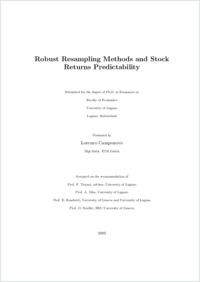Robust resampling methods and stock returns predictability
- Camponovo, Lorenzo
- Trojani, Fabio (Degree supervisor)
-
22.12.2009
101 p
Thèse de doctorat: Università della Svizzera italiana, 2009 (jury note: summa cum laude)
English
The thesis consists of three chapters. In the first chapter we characterize the robustness of subsampling procedures by deriving a general formula for the breakdown point of subsampling quantiles. This breakdown point can be very low for moderate subsampling block sizes, which implies the fragility of subsampling procedures, even if they are applied to robust statistics. This instability arises also for data driven block size selection procedures minimizing the minimum confidence interval volatility index, but can be mitigated if a more robust calibration method is applied instead. To overcome these robustness problems, we propose a consistent robust subsampling procedure for M-estimators and derive explicit subsampling quantile breakdown point characterizations for MM-estimators in the linear regression model. Monte Carlo simulations in two settings where the bootstrap fails show the accuracy and robustness of the robust subsampling relative to the classical subsampling. In the second chapter we study the robustness of block resampling procedures for time series. We first derive a set of formulas to quantify their quantile breakdown point. For the block bootstrap and the subsampling, we find a very low quantile breakdown point. A similar robustness problem arises in relation to data-driven methods for selecting the block size in applications, which can render inferences based on standard resampling methods useless already in simple estimation and testing settings. To solve this problem, we introduce a robust fast resampling scheme that is applicable to a wide class of time series settings. Monte Carlo simulation and sensitivity analysis for the simple AR(1)model confirm the dramatic fragility of classical resampling procedures in presence of contaminations by outliers. They also show the better accuracy and efficiency of the robust resampling approach under different types of data constellations. In the third chapter we analyze the predictability of stock returns. A large literature studies the predictability of stock returns by other lagged financial variables in a predictive regression setting. A common feature of widely used testing procedures is a failing statistical robustness, which may lead to misleading conclusions determined by the particular features of a small subfraction of the data. We propose a new general method to deal with this problem based on the robust subsampling approach. The method implies robust confidence intervals and inference results. It is applicable both in the multi-predictor context and in settings with nearly integrated regressors. Simulation evidence confirms the higher accuracy and efficiency of our robust testing approach for typical applications in which the data may follow only approximately the predictive regression model. We apply our approach to US equity data from 1961 to 2008 and find that it yields a stronger evidence in favor of predictability than a number of other (nonrobust) tests in the literature.
- Language
-
- English
- Classification
- Economics
- License
-
License undefined
- Identifiers
-
- RERO DOC 17078
- URN urn:nbn:ch:rero-006-108768
- ARK ark:/12658/srd1318333
- Persistent URL
- https://n2t.net/ark:/12658/srd1318333
Statistics
Document views: 378
File downloads:
- Texte intégral: 196
